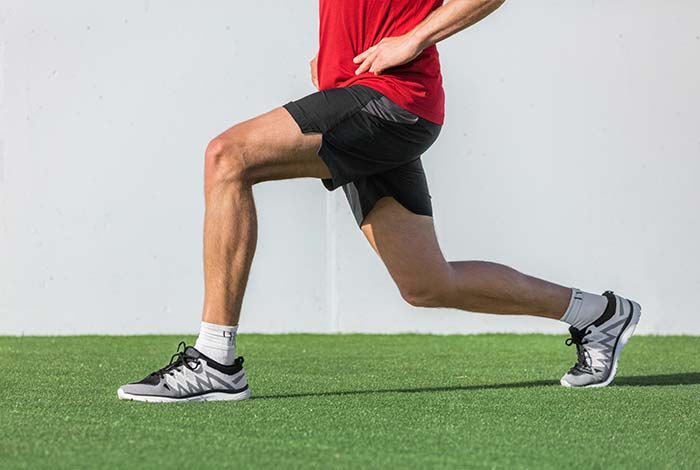Sports-related knee injuries are common and can range from minor sprains and strains to ligament tears, dislocations and patella fractures. Your knee is particularly vulnerable to injury as it is a weight-bearing joint with many different components. You may injure your bones (there are three in your knee including the kneecap), ligaments (which connect the bones and keep the knee stable), tendons (connecting the muscles to the bones) or cartilage (including the meniscus – a wedge-shaped piece of cartilage that helps cushion and stabilise each knee). If you injure yourself playing sport, it is important to stop immediately as continuing to play with an injury may lead to further and potentially more serious problems.
Common Injuries
Among the most common sports-related knee injuries are:
- Knee Meniscal Injury – Injuries to the meniscus are common among athletes. Each knee has two menisci, which are C-shaped pieces of cartilage that cushion your shinbone and thighbone. If you tear your meniscus your knee may feel like it is giving way and you may experience pain when twisting or rotating it.
- ACL Injury – The ACL is the anterior cruciate ligament which connects your thigh bone to your shinbone, helping to stabilise your knee joint. An activity that places your knee under undue stress (such as landing awkwardly from a jump or stopping suddenly) can cause ACL injuries.
- Patella fractures – These are normally caused by a direct blow to the kneecap or heavy fall. The patella (kneecap) is the most frequently broken bone in the knee, although you may also fracture your femur or tibia.
- Tendon tears – You may stretch or tear your quadriceps or patella tendon. This type of injury is particularly common in middle-age people who participate in running or jumping activities, especially if they suddenly increase their training schedule.
- Knee dislocation – This is where the bones of the knee joint are forced out of place, often as the result of a high impact accident such as a heavy fall or collision.
Causes of knee sports injuries and trauma
- Knee meniscal injuries can occur if you forcefully twist your knee, for example if you suddenly stop or change direction. A torn meniscus can also result from lifting something heavy or deep squats.
- ACL Injuries are common in sports that involve making sudden stops or changes of direction as well as jumping and landing, such as football, basketball and skiing.
- Fractures, sprains and tendon tears are common sporting injuries and may range from stress fractures and minor sprains through to compound fractures or ruptures. Injuries can be the result of fall, collision or direct impact, or they may be due to a sudden increase in the intensity or duration of training.
- Knee dislocations are normally the result of a high impact collision or falling heavily onto the knee.
Symptoms of knee sports injuries and trauma
- Knee meniscal injuries cause pain, swelling and problems straightening your knee. You may experience a popping sensation and your knee may become weak and feel like it is giving way.
- ACL injuries may result in severe pain, swelling and loss of function. There may be a popping sound or sensation.
- Fractures, sprains and strains vary in severity from minor pain and swelling to being unable to use the affected limb.
- Dislocations cause severe pain and deformity of the knee.
Diagnosis of knee sports injuries and trauma
Diagnosis will involve a physical examination and you may also need diagnostic imaging (X-ray, CT scan or MRI scan) to confirm the diagnosis and/or assess the damage.
Treatment of knee sports injuries and trauma
Treatment will depend on the type and severity of the injury. In the case of ACL injury, for example, you may need to wear a brace to support your knee and undergo several weeks of physiotherapy to strengthen the muscle and restore function to your knee. However, in some cases the injury may be so severe that it requires ACL reconstruction surgery. This involves removing the damaged ligament and replacing it with a section of tendon. The RICE method (rest, ice, compression, elevation) can be effective at relieving pain and swelling in the case of minor sprains and strains. In some cases a knee brace or physiotherapy exercises may be needed, while for the most serious injuries you are likely to need surgery. Whatever type of injury you sustain, your orthopaedic surgeon will assess the damage and discuss the treatment options with you.
OUR CONSULTANTS
We are an experienced and highly qualified team of orthopaedic surgeons using the latest surgical and non-surgical techniques to eliminate or reduce pain so our patients can experience the best possible quality of life.
BOOK A CONSULTATION
Whether you have an existing diagnosis or you are keen to discover what is causing your symptoms, contact us to arrange a consultation. We can organise any tests you require and discuss your treatment options.
What Our Patients Say

